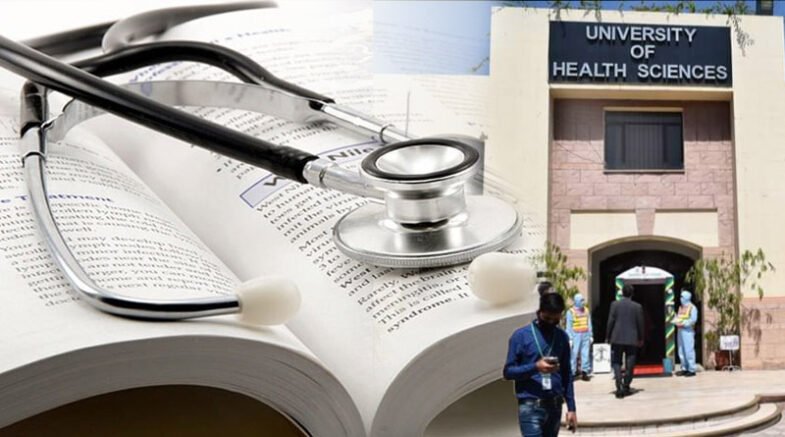The new policy is designed in accordance with the new modular and integrated medical curriculum that the university introduced this year in its affiliated medical colleges.

In a joint meeting held on Saturday, the Academic Council and Board of Studies in Medicine of the University of Health Sciences (UHS) approved a new assessment policy for first-year MBBS students.
The new policy is designed in accordance with the new modular and integrated medical curriculum that the university introduced this year in its affiliated medical colleges.
The vice chancellor, Professor (Prof) Ahsan Waheed Rathore, and the senior faculty of the affiliated institutions were present at the meeting. Additionally present were Prof. Saqib Mahmood, the controller of exams, and Prof. Nadia Naseem, the UHS registrar.
The first professional MBBS exam will have four papers worth a combined total of 1000 marks under the new assessment policy. One paper will be on Islamiat and Pakistan Studies, and the other three papers will be based on the material covered in the three curriculum blocks taught throughout the year. Each component—the theory paper and the practical exam—will be worth 150 points.
The short essay question will be worth five marks, while each multiple-choice question will be worth one mark. Anatomy, Physiology, and Biochemistry with their clinical application are the main topics covered in the first year of MBBS.
Behavioral sciences, community medicine, public health, pathology, pharmacology, and clinical foundation are examples of minor subjects. In the first year, courses on professionalism, ethics, information technology, research, leadership, and the Holy Quran will also be offered.
Based on the results of the block exams and attendance in class, the relevant medical college will send the university the internal evaluation of each student. In university professional exams, a passing score is 50 percent. A minimum of 50 percent of the possible points must be earned in the block exam for the student to pass.
The student will have to make up the difference in the following block exam, though, if the marks in the block exam are less than 50 percent. There won’t be any more send-up exams in medical colleges under the new curriculum and examination policy.
Twelve Objective Structured Practical Examinations (OSPE) and three Objective Structured Clinical Examination (OSCE) stations will make up each practical exam. The structured viva will consist of three stations, each worth ten marks. The practical exam will last for two and a half hours.
For distinction, a candidate must earn at least 85 percent of the possible points overall, provided that he receives 80 percent on the written test. UHS Vice Chancellor Prof. Ahsan Waheed Rathore addressed the audience and announced that the university would soon publish a sample paper for the use of faculty and students.
In order to increase examination transparency, he stated that internal and external examiners would be required to submit their marks to the university separately for the practicals.
Dr. Rathore added that the examination process was being updated and that no faculty member would be permitted to serve as an examiner going forward unless they had attended the university’s required training sessions. He added that to keep an eye out for any irregularities, a brand-new, strong examination monitoring system had also been installed.
Dr. Khalid Rahim, Director of Medical Education at UHS, gave the participants a briefing on the new examination policy. Two professors, Prof. Dr. Muhammad Shahzad and Prof. Zahid Bashir, were proposed for the Finance and Planning Committee by the Academic Council.
The council also gave their approval to a panel of four professors to serve on the affiliation committee. Professors Dr. Allah Rakha, Asif Qureshi, Sameer Anwar, and Mulazim Hussain Bukhari are on the panel.
